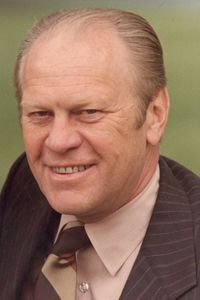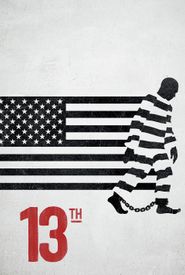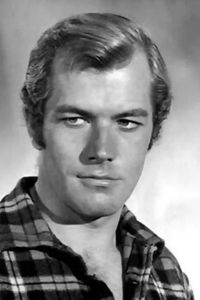Here is the biography of Gerald Rudolph Ford:
Gerald Rudolph Ford was the 38th President of the United States, serving from August 1974 until January 1977. Born on July 14, 1913, in Omaha, Nebraska, as Leslie Lynch King Jr., Ford was the son of Leslie Lynch King and Dorothy Ayer Gardner King. His parents separated two weeks after his birth, and his mother took him to Grand Rapids, Michigan, to live with her parents. On February 1, 1916, his mother married Gerald R. Ford, a paint salesman, and the Fords began calling their son Gerald R. Ford Jr. The name became legal only on December 3, 1935.
Ford grew up in a family with three younger half-brothers, Thomas, Richard, and James. He attended South High School in Grand Rapids, where he showed his athletics skills, being named to the honor society and the "All-City" and "All-State" football teams. As a scout, he was ranked Eagle Scout in November 1927. He earned money by working in the family paint business and at a local restaurant.
Ford attended The University of Michigan at Ann Arbor from 1931 to 1935, majoring in economics and political science, and graduated with a B.A. degree in June 1935. He played on the University's national championship football teams in 1932 and 1933 and was voted MVP of Wolverine in 1934. He also played in All-Star and benefit football games. He denied offers from two professional football teams, the Detroit Lions and Green Bay Packers, but chose to become a boxing coach and assistant varsity football coach at Yale, hoping to attend law school there. Ford earned his law degree in 1941.
After returning to Michigan and passing his bar exam, Ford set up a law partnership in Grand Rapids with Philip Buchen, a University of Michigan fraternity brother. In April 1942, Ford joined the U.S. Naval Reserve and became a physical fitness instructor at a flight school in Chapel Hill, North Carolina. In the spring of 1943, he began service in the light aircraft carrier USS Monterey. Ford spent the remainder of the war ashore and was discharged as a lieutenant commander in February 1946. He returned to Grand Rapids to become a partner in the locally prestigious law firm of Butterfield, Keeney, and Amberg.
His first political experience was in the summer of 1940 when he was working in the presidential campaign of Wendell Willkie. Six years later, he decided to challenge Bartel Jonkman for the Republican nomination for the U.S. House of Representatives in the 1948 election. Ford won the nomination and was elected to Congress on November 2, 1948, receiving 61% of the vote.
On October 15, 1948, Ford married Elizabeth ('Betty') Anne Bloomer Warren, a department store fashion consultant. Betty was born on April 8, 1918, in Chicago, Illinois, but grew up in Grand Rapids. They subsequently had four children: Michael Gerald (March 14, 1950),John Gardner (March 16, 1952),Steven Meigs (May 19, 1956),and Susan Elizabeth (July 6, 1957).
Ford served in the House of Representatives from January 3, 1949, to December 6, 1973. He was re-elected twelve times, winning each time with more than 60% of the vote. As his ambition was to become Speaker of the House, he denied offers to run for both the Senate and the Michigan governorship in these years. In 1961, he became chairman of the House Republican Conference. In 1963, President Johnson appointed Ford to the Warren Commission to investigate the assassination of President John F. Kennedy. He was the last living member of the Warren Commission.
In 1965, Ford was chosen as the House minority leader, a post he held until 1973. As minority leader, Ford made more than 200 speeches a year all across the country, which made him nationally known. He was not only a close friend of Richard Nixon for many years but also a loyal supporter in both the 1968 and 1972 presidential elections. As in 1960, Ford was again considered as a vice presidential candidate in 1968. Because the Republicans did not attain a majority in the House, Ford was unable to reach his ultimate political goal, Speaker of the House. Instead, he became President of the Senate.
Late in 1973, Spiro Agnew pleaded no contest to a charge of income tax evasion and resigned as Vice President. President Nixon was empowered by the 25th Amendment to appoint a new vice president and chose Ford. He was sworn in on December 6, 1973.
On August 9, 1974, Nixon became the first president in U.S. history to resign from



















































